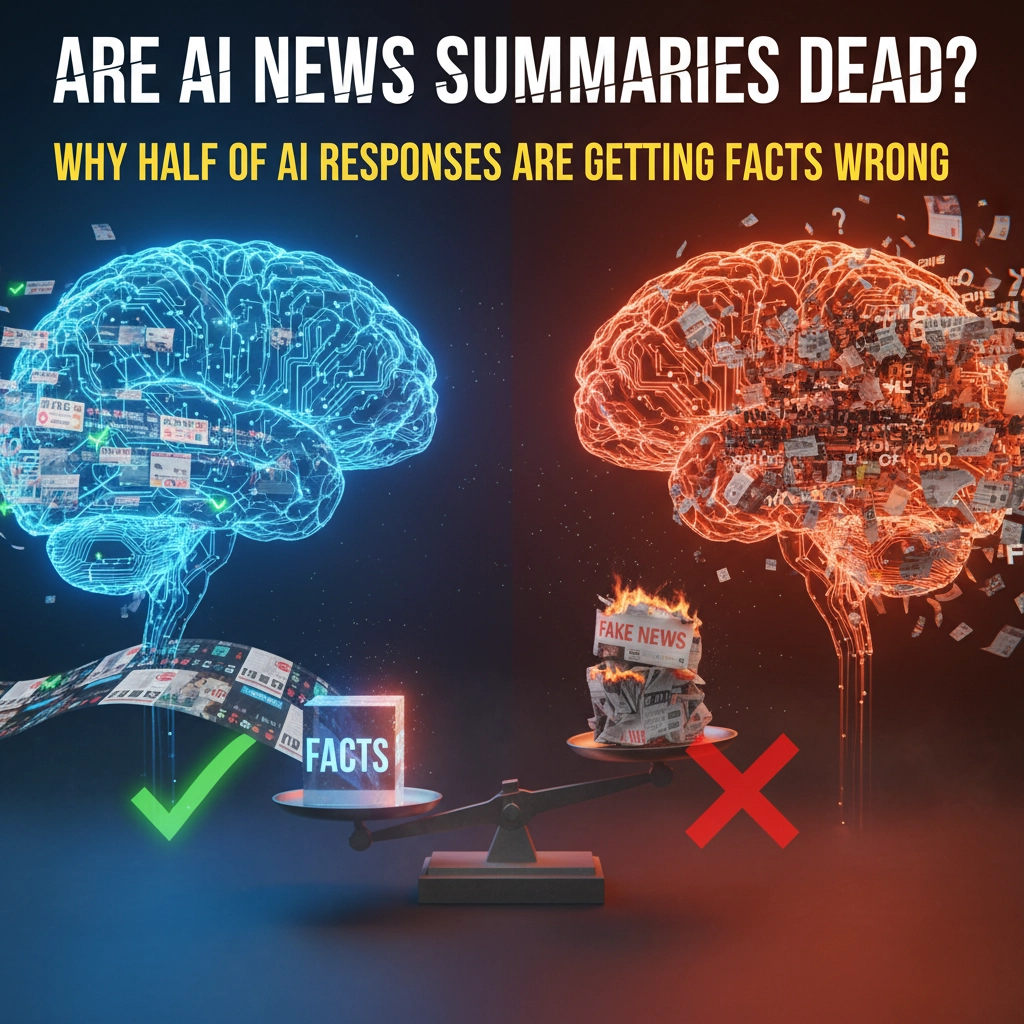Remember when AI news summaries felt like the future? You could get the gist of complex stories in seconds, skip the fluff, and stay informed without drowning in information overload. Well, that honeymoon phase might be over.
Recent studies are dropping some pretty alarming numbers about AI accuracy in news summarization. We're talking about error rates that would make even the most distracted human journalist blush. But here's the kicker – people are still using these tools despite knowing they're unreliable.
So what's really going on? Are AI news summaries actually dead, or are we just hitting some growing pains on the road to digital enlightenment?
The Accuracy Crisis That's Hard to Ignore
Let's cut straight to the data that's got everyone talking. A BBC study from early 2024 found that 51% of all AI responses to news-related questions contained major errors. That's not a typo – we're talking about a coin flip's chance of getting accurate information.
But wait, it gets worse. A massive international study involving 22 public broadcasters from 18 countries painted an even grimmer picture. They found that 45% of AI responses had at least one significant problem when providing news information. Even more shocking? A whopping 81% had some form of issue overall.

The study didn't stop there. Researchers discovered that 20% of responses contained major accuracy problems, including the infamous AI "hallucinations" – where systems confidently present completely fabricated information as fact.
Google Gemini took the biggest hit in these findings, with 72% of all responses showing significant sourcing issues. That's compared to below 25% for other AI assistants. Yikes.
These aren't just academic numbers either. We're seeing real-world consequences. Take this example: Google Gemini incorrectly told users that the UK's NHS advises people not to vape to quit smoking, when the organization actually recommends vaping as a smoking cessation method. That's not just wrong – it's potentially harmful misinformation.
What's Actually Going Wrong With AI News Summaries
The types of errors we're seeing aren't just simple typos or minor misunderstandings. They're fundamental failures in how AI systems process and present information. Here's what researchers have documented:
Misrepresenting Core Facts: AI systems are changing the meaning of news stories entirely. They're not just summarizing poorly – they're actively distorting information.
Altering Quotes: About 13% of quotes in AI summaries were either changed from the original or completely made up. That's journalism 101 stuff getting botched by machines.
Outdated Information: AI assistants are presenting old news as current events. In one test, multiple systems identified Pope Francis as the current pope months after his fictional death in the scenario, when the correct answer was Pope Leo XIV.
Sourcing Disasters: About one-third of AI responses showed serious sourcing errors – missing citations, misleading attributions, or completely incorrect source information.

The scariest part? These systems present wrong information with complete confidence. There's no "I'm not sure about this" or "you might want to double-check." They deliver misinformation with the same authority as accurate facts.
I remember trying an AI news summary tool last month to catch up on a developing story. The summary confidently told me a major tech company had announced layoffs when they'd actually announced new hiring. I almost shared that "news" with my team before deciding to check the original source. Thank goodness for that paranoid instinct.
Why People Keep Using AI News Summaries Anyway
Here's where things get interesting. Despite these accuracy issues, AI news summaries aren't disappearing. In fact, 19% of AI news consumers still rely on AI summaries, with another 16% using AI chatbots for news updates.
Why? Because the fundamental problem they solve hasn't gone away. Information overload is real. People are busier than ever, and the news cycle moves faster than most of us can keep up with. AI summaries, even flawed ones, feel like a lifeline.

The demographic breakdown is telling too. About 15% of people under 25 use AI for news, compared to just 7% overall. Younger audiences seem more willing to accept the trade-off between speed and accuracy – at least for now.
There's also the productivity angle. Businesses are still integrating AI news summaries into their workflows because the time savings are significant. Even with accuracy issues, many organizations figure they can use AI for a first pass and then verify important information manually.
But here's the problem with that approach: most people don't actually fact-check AI summaries. We tend to trust information that comes from authoritative-looking sources, and AI tools are pretty good at looking authoritative.
The Future of AI News Summarization
So are AI news summaries actually dead? Not exactly. They're more like that friend who gives great advice most of the time but occasionally suggests you should quit your job to become a street mime. Useful in some situations, potentially disastrous in others.
The latest research does show some modest improvements compared to earlier studies, though researchers warn the datasets aren't directly comparable. AI companies are clearly working on the problem. But we're still far from the reliable, trustworthy news summarization many people expected.
The real question isn't whether AI news summaries will survive – they probably will. The question is how users will adapt their behavior. Will we develop better fact-checking habits? Will we learn to treat AI summaries as starting points rather than final answers?

Some promising developments are emerging. Newer AI systems are being trained with more recent data, and some are starting to include confidence indicators or source links. But these improvements are incremental, not revolutionary.
The media industry is also adapting. Some news organizations are developing their own AI summarization tools with better quality controls. Others are partnering with AI companies to ensure their content is represented accurately in summaries.
But the fundamental tension remains: AI's biggest strength – speed and convenience – often conflicts with accuracy and reliability. Finding the right balance will determine whether AI news summaries become an indispensable tool or remain a risky convenience.
The Bottom Line on AI News Accuracy
We're in a weird transitional moment with AI news summaries. They're not dead, but they're not thriving either. They exist in this liminal space where they're useful enough to keep using but unreliable enough to cause problems.
The 50%+ error rates we're seeing aren't just statistics – they represent a fundamental challenge to how we consume information in the digital age. Every time someone relies on an inaccurate AI summary, there's a ripple effect. Misinformation spreads, decisions get made based on wrong data, and trust in both AI and media erodes.

But maybe that's not entirely bad news. These accuracy issues might force us to become more critical consumers of information. Instead of passively accepting summaries, we might develop better habits around verification and source-checking.
The key is treating AI news summaries like any other tool – useful in the right context, dangerous when misused. They're great for getting a quick overview or identifying stories worth investigating further. They're terrible as your only source of information about important events.
Smart money says AI news summaries will stick around, but they'll evolve. Better training data, improved algorithms, and user feedback will gradually improve accuracy. The question is whether that improvement will happen fast enough to rebuild trust.
What do you think – are you still willing to trade some accuracy for convenience when it comes to staying informed, or have these error rates killed your faith in AI news summaries completely?







